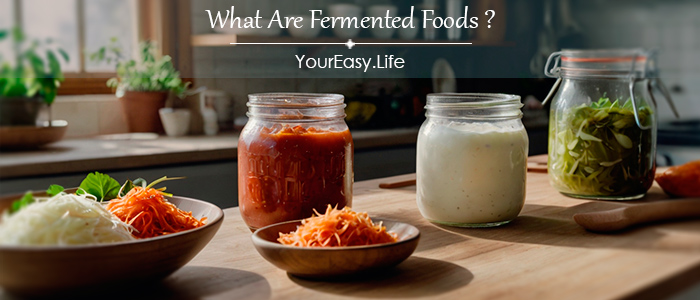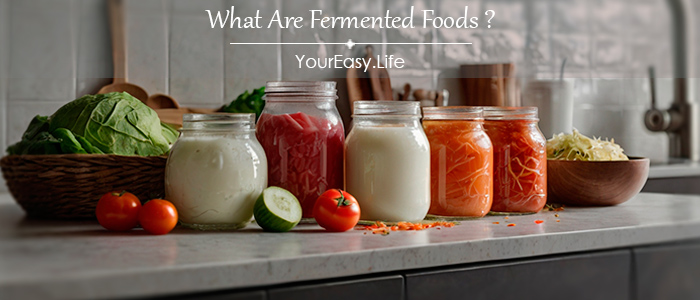Imagine this: you come home after a long day, feeling tired and maybe even a little drained. The last thing you want to do is prepare a complicated dinner or try to figure out what’s healthy and what’s not. This is exactly when fermented foods can come to your rescue.
Fermented foods are true treasures for your health. These are foods like yogurt, kefir, sauerkraut, or kimchi that have undergone the process of fermentation. At first glance, it might seem like something complicated, but it’s actually much simpler. This process happens thanks to microorganisms—beneficial bacteria, yeasts, or molds—that transform carbohydrates into useful substances like organic acids and probiotics.
Table Of Contents
Why Are Fermented Foods So Important?
Have you ever wondered why you sometimes feel tired, sluggish, or even prone to depression? Often, this is connected to the state of our gut, which many scientists now refer to as the “second brain.” When the gut microbiome is out of balance, it affects the entire body—from your mood to the condition of your skin.
To restore this balance, fermented foods, rich in probiotics, are exactly what you need. Probiotics are beneficial bacteria that help maintain a healthy gut microbiome. They aid in better nutrient absorption, support the immune system, reduce inflammation, and can even improve your mood.
“What if I have digestive issues?”
Don’t worry, this is exactly where fermented foods can help! They not only ease the digestive process but also improve the overall condition of the gastrointestinal tract. If you’re troubled by bloating, heaviness, or other digestive issues, fermented foods can become your best friends.
What Are The Benefits Of Fermented Foods?
Probiotics – fermented foods are rich in probiotics, which are beneficial bacteria that support gut health. Probiotics help improve digestion, maintain a balance of microflora in the gut, and boost the immune system.
Improved Digestion – fermentation partially breaks down foods, making them easier for the body to digest and absorb. For example, lactose in dairy products is fermented into lactic acid, making these foods more tolerable for people with lactose intolerance.
Nutrient Boost – the fermentation process makes some vitamins and minerals more bioavailable, meaning they are easier for the body to absorb. Fermentation can also increase the levels of certain vitamins, such as B12.
Immune Boost – probiotics from fermented foods help boost the immune system, increasing the body’s defenses against pathogens.
Reduced inflammation – some fermented foods contain antioxidants and other compounds that may help reduce inflammation in the body.
How Can Fermented Foods Change Your Life?
You might be thinking, “Yeah, it sounds good, but can it really help?” The answer is yes—it can not only help but completely transform your approach to nutrition and health. Imagine that every time you eat a spoonful of yogurt or a bite of sauerkraut, you’re helping your body function better. You’re providing it with probiotics that improve digestion, strengthen the immune system, and may even reduce stress levels.
Fermented foods can be the key to your health. For instance, have you ever felt heavy or sleepy after a big dinner? Try adding kefir or yogurt to your diet, and you’ll notice how your body starts to thank you for the care. Gradually, you’ll begin to feel more energetic, and fatigue will fade away.
“What if I don’t like the taste of fermented foods?”
Well, tastes can change, and often, you just need to give yourself time to get used to them. Start with small portions, and you might find that some of these foods actually appeal to you. And if that doesn’t work—try different types of fermented foods, like swapping yogurt for kefir or sauerkraut for kimchi. Each one has its own unique flavor, and surely you’ll find something you like.
What Do Fermented Foods Contain?
- Probiotics (Lactobacilli, Bifidobacteria, etc.)
- Organic acids (such as lactic acid), which enhance digestion.
- Enzymes, which help break down food.
- Vitamins (especially B vitamins and Vitamin K2).
- Antioxidants that protect cells from damage.

Which Fermented Foods Should You Try?
Here are a few options that can be a great starting point:
- Yogurt — a classic choice, rich in probiotics and B vitamins.
- Kefir — a drink similar to yogurt but with a more liquid consistency and a rich composition of beneficial bacteria.
- Sauerkraut — a traditional fermented vegetable, packed with fiber and vitamins.
- Kimchi — a Korean dish made from fermented vegetables with added spices, renowned for its powerful probiotic properties.
- Miso — a Japanese paste made from fermented soybeans, which is not only rich in probiotics but also an excellent source of protein.
“Fermented foods have a strange taste.”
Fermented foods can indeed have an unusual taste because they contain organic acids and probiotics. However, over time, many people get used to them and even begin to enjoy their flavors. Try different types of fermented foods to find the one that suits your taste.
“I’m afraid that fermented foods might cause food poisoning.”
When prepared correctly, fermented foods are completely safe because the microorganisms involved in fermentation create an environment where pathogenic bacteria cannot survive. The most important thing is to maintain cleanliness and follow the recipe.
“I don’t notice any effect from consuming fermented foods.”
The effect of consuming fermented foods may not be immediately noticeable. However, over time, regular consumption can improve gut health and overall well-being. Just give your body time to adjust.
Is It Important To Consume Fermented Foods Regularly?
You might ask, “Is it enough to eat something fermented once to feel the effect?” The answer is: consistency is key to success. For fermented foods to positively impact your health, they need to become part of your daily diet. Gradually incorporate them into your meals, and within a few weeks, you’ll notice a change in how you feel. If not right away—don’t worry, sometimes it takes time for your body to adapt to new habits.
“What if I doubt their benefits? What if it’s all exaggerated?”
Doubts are normal. However, there’s no exaggeration here. Research shows that fermented foods do improve digestion, boost immunity, and reduce stress levels. This has been proven by many people and confirmed by scientists. Of course, as with anything, it’s important not to overdo it. Start with small doses and listen to your body—it will tell you what’s best.
Conclusion
So, what’s next? What’s the next step? It’s simple—try adding some fermented foods to your diet. Feel how your well-being changes, how digestive issues disappear, how you gain more energy and improve your mood. And remember, we at YourEasy.Life are always here to support you on this journey. This isn’t just about nutrition; it’s your path to health, and fermented foods can become an important part of it.





